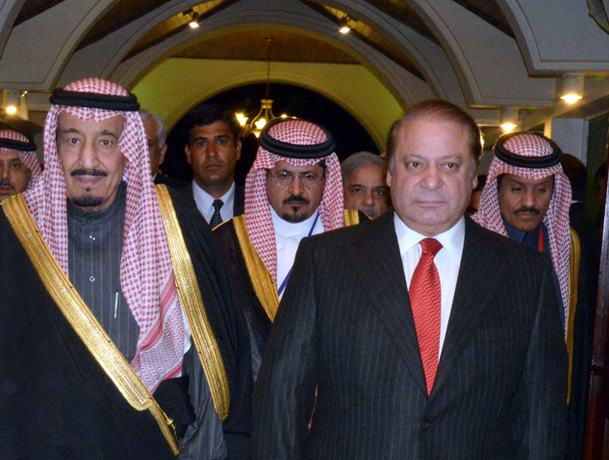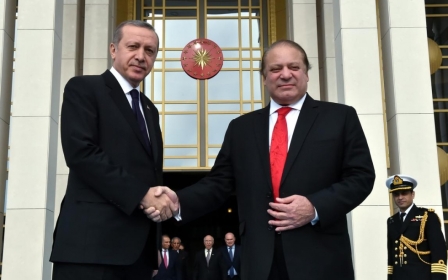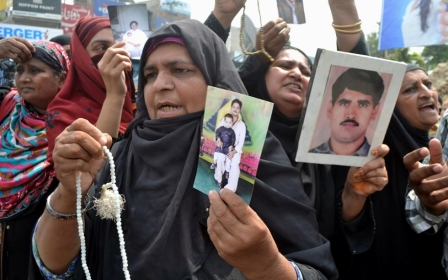Pakistan's Nawaz Sharif, not his army, the world’s most dangerous…

No country has had more written about its army in the past decade than Pakistan. Every three years, there is more global speculation about who will be Pakistan army chief than there is over the appointment of the head of the US military.
It is no mystery, since Pakistan’s military commands the strongest air force in the Islamic world and has the world’s fastest-growing nuclear arsenal. The country has been dubbed the world’s most dangerous country by at least three magazines - Newsweek, the Economist and Time. Yet few analysts look beyond the simplistic nature of this discourse: the true danger that Pakistan poses comes in the shape of its current prime minister, Nawaz Sharif.
In the past few weeks, Sharif has mobilised the right-wing sectarian groups Jamaat Ud Dawa (JUD) and Ahlah Sunna wa Jamaat (ASWJ), two militant outfits that were born out of the Afghan-Arab groups during the Afghan civil war in the 1980s. Both these parties have links to terrorist groups that have killed Sunni and Shiite alike. They are putting heavy pressure on the Pakistani media and army for troops to be sent to fight in Yemen and beyond.
What is even more disturbing is that lies are being spun in the Pakistan media insinuating that the Houthis have already attacked Saudi soil, thus suggesting that the battle in Yemen has become a holy war incumbent on Pakistan. There is nothing holy about Saudi Arabia to begin with, yet often under Sharif’s premiership efforts are made to convince the illiterate masses of Pakistan that Saudi Arabia is synonymous with Islam and thus Pakistan’s creation.
Pakistan suffers from multiple identity issues and ethnic wars between the Pashtun, the Punjabi and the Baluch; only Islam unites the country, as it was created for the Muslims of the subcontinent, and its media see Pakistan’s powerful army as the protector of Saudi Arabia.
Under Sharif’s direction a strong narrative has been built of equating the House of Saud to an infallible ordained family that protects Islam, and thus Pakistan, having the most powerful Muslim army, must protect the al-Sauds.
However, if you talk to Western defence chiefs and long-term CIA experts they are quick to caution against the oft-repeated narrative of “Islamic” generals at the helm of nuclear weapons and commanding an array of militant groups rivalled only by the groups in Iraq and Syria.
Aside from the Western narrative on Pakistan, there is also an Arab narrative: Pakistan is now the only Muslim country to possess nuclear weapons; it has also previously been a full participant in the wars against Israel in 1967 and 1973.
Furthermore, its pilots have shot down Israeli planes, and have also taken part in Arab civil wars, most notably in the 1970 overthrow of the PLO during Black September in Jordan and during previous Saudi-Yemen skirmishes when its pilots were in the cockpits of Saudi jets.
The latest skirmish in Yemen, though, sheds new light on the increasing sectarian divide in the Pakistani political and military leadership. Pakistan’s military has always prided itself on its professional ethos and the non-sectarian nature of its general officer corps, but, since the nuclear tests in 1998, it has pulled ever closer to the Saudi leadership.
The prime minister during that earlier period was Nawaz Sharif. Since coming to power for a third time almost two years ago, Sharif has made a dizzying number of visits to Riyadh, and similarly there is a revolving door of top-tier Saudi princes in and out of Islamabad on a weekly basis.
It is no secret that the Saudis see Pakistan as very much in their sphere of influence. The Saudis have boasted that they are not just influential in Pakistani politics and security affairs, but they are active participants. Furthermore, the Saudis have always seen former president Asif Ali Zardari and the Pakistan Peoples Party, which he co-chairs and whose leadership is predominantly Shiite, as “rotten”. The PPP was created by the leading Shiite feudal family, the Bhuttos from Sindh, and is seen as heretical as far as Saudis are concerned.
Every time Sharif has come to power, he has had a run-in with the Pakistan military leadership and has interfered in the promotion processes of the Army Board, the military body that oversees the elevation of military officers. There has been much speculation about Saudi Arabia’s role in the promotion ladder of Pakistan’s army with the help of Sharif’s premiership.
Sharif’s credentials as a supporter of the Taliban have also been an open secret, with active “ignorance” of the Punjabi Taliban. The south of Punjab is where most of the Saudi funding ties in with the most extreme groups that have been linked to the violence in Afghanistan and even Iraq and Syria. The Saud family own thousands of acres in southern Punjab, which are used for their food security and hunting grounds for falcons.
An increasing sectarian rift in Pakistan has been seen since Sharif’s latest return to power in 2013, with attacks on the Shiite community reaching a new high in the past 12 months. The government has looked away at the plight of these communities in comparison to attacks on army schools and charities.
Similarly, on the issue of the Syria war, Sharif’s extreme Wahabi nature has shown its true colours (his father reportedly followed a Salafist group, Ahl al-Hadith, which rejects claims it is synonymous with Wahabism). Sharif has seen the Syrian war as a Shiite-Sunni war despite most of the Syrian Arab Army officer corps being Sunni, Christian and Druze, yet Sharif, pressured by the Saudis, has falsely told the Pakistani political leadership that the war in Syria is an assault on Sunnis
Syria and Pakistan have always been strong military allies with deep counter-intelligence ties. Pakistan has historically been one of the largest trainers of the Syrian Air Force, and also regularly exchanges military officers and sells equipment to the Syrians. Yet this five-decade-old historic relation was put aside when, under heavy Saudi pressure, Sharif called for the Syrian government to step aside as it had lost credibility.
This shift in a historic stance towards Syria came about through direct pressure from the then-Saudi Crown, and now ruler, Prince Salman. Sharif has also had strong relationships with the Hariri family in Lebanon, and used the “old-school” Afghan-Arab jihadi network to facilitate Sunni groups in Lebanon to take on Hezbollah.
The most disturbing element of the Sharif-Saudi alliance in Lebanon has been the arming of the Wahabi groups in Nahr al-Bared and Ain al-Hilweh Palestinian camps in Lebanon, which turned into an all-out skirmish in 2008-2009.
The present conflict in Yemen has the potential to turn Sharif’s sectarian objectives from being covert to overt. That he has always been close to the Saudis has never been in doubt to seasoned Pakistan watchers. But the growing bravado with which the Saudis lord it over Pakistan has the potential to further exasperate the region’s problems as most of the Gulf Cooperation Council looks to Pakistan to provide security to Saudi Arabia, Bahrain and increasingly also Qatar.
Pakistan took full part in the suppression of the popular uprising in Bahrain in 2011, and Pakistani Sunni families have been given Bahraini passports to settle in Bahrain with a strong bias towards military and security as a background prerequisite to get this citizenship.
All the opposition parties in Pakistan have come out against Sharif’s support for the Saudis in the conflict in Yemen. Saudi Arabia without doubt sees as its own Pakistan’s nuclear arsenal and Riyadh’s increasing involvement in all aspects of Pakistan’s foreign policy means that the worst fears of international observers may not be sensationalist as some thought previously.
Perhaps the most telling sign of Pakistan’s full participation in Saudi Arabia’s sectarian wars has been the “official” announcement by the Saudis on 30 March that Pakistan has agreed to be part of the coalition against the Houthi militants. This decision was taken even before the Pakistani parliament or defence committees had met to discuss the motion.
Moreover the announcement came from Saudi sources rather than Pakistani. (After days of debate, Pakistan's parliament has now decided against military involvement in the Saudi-led coalition fighting the Houthi militants.)
The Pakistan-Saudi relationship has begun to resemble that of a puppet and its master. Iran is extremely cautious about Pakistan’s growing tilt towards playing Saudi Arabia’s dirty games in the Middle East, from Lebanon and Syria on towards Bahrain and Yemen. Yet, Pakistan’s prime minister looks set to take his nuclear-armed state into a full involvement in Arab conflicts.
Photo: Prime Minister Nawaz Sharif with King Salman Bin Abdulaziz al-Saud (AFP)
New MEE newsletter: Jerusalem Dispatch
Sign up to get the latest insights and analysis on Israel-Palestine, alongside Turkey Unpacked and other MEE newsletters
Middle East Eye delivers independent and unrivalled coverage and analysis of the Middle East, North Africa and beyond. To learn more about republishing this content and the associated fees, please fill out this form. More about MEE can be found here.





